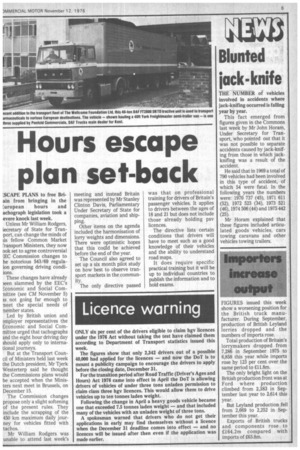Hours escape plan set-back
Page 7

If you've noticed an error in this article please click here to report it so we can fix it.
:SCAPE PLANS to free Briain from bringing in the :uropean hours and achograph legislation took a evere knock last week.
Unless Mr William Rodgers, ;ecretary of State for Tran;port, can change the minds of us fellow Common Market fransport Ministers, they now ook set to agree controversial EC Commission changes to he notorious 543/69 regulaion governing driving condiions.
These changes have already )een slammed by the EEC's F.,conomic and Social Com-nittee (see CM November 5) as not going far enough to meet the special needs of member states.
Led by British union and amployer representatives the Economic and Social Cornmittee urged that tachographs and the eight hour driving day should apply only to international journeys.
But at the Transport Council of Ministers held last week the Dutch president, Mr Tjerk Westerterp said he thought the Commissions plans would be accepted when the Ministers next meet in Brussels, on December 15.
The Commission changes propose only a slight softening of the present rules. They include the scrapping of the 450 km maximum daily journey for vehicles fitted with tachos.
Mr William Rodgers was unable to attend last week's meeting and instead Britain was represented by Mr Stanley Clinton Davis, Parliamentary Under Secretary of State for companies, aviation and shipping.
Other items on the agenda included the harmonisation of lorry weights and dimensions. There were optimistic hopes that this could be achieved before the end of the year.
The Council also agreed to set up a six month pilot study on how best to observe transport markets in the community.
The only directive passed was that on professional training for drivers of Britain's passenger vehicles. It applies to drivers between the ages of 18 and 21 but does not include those already holding psv licences.
The directive lists certain conditions that drivers will have to meet such as a good knowledge of their vehicles and the ability to understand road maps.
It does require specific practical training but it will be up to individual countries to publish the information and to hold exams.












































































































































